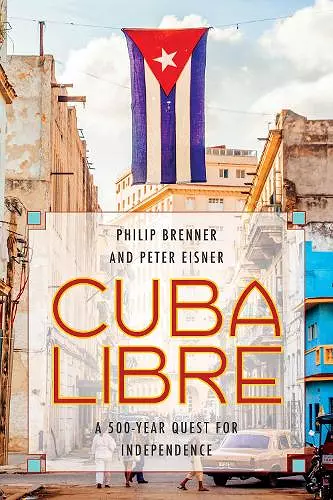Cuba Libre
A 500-Year Quest for Independence
Philip Brenner author Peter Eisner author
Format:Paperback
Publisher:Rowman & Littlefield
Published:31st Aug '17
Currently unavailable, and unfortunately no date known when it will be back

This timely book provides a balanced and deeply knowledgeable introduction to Cuba since Christopher Columbus’s first arrival in 1492. With decades of experience studying and reporting on the island, Philip Brenner and Peter Eisner provide an incisive overview for all readers seeking to go beyond stereotypes in their exploration of Cuba’s politics, economy, and culture. As Cuba and the United States open their doors to each other, Cuba Libre gives travelers, policy makers, businesspeople, students, and those with an interest in world affairs an opportunity to understand Cuba from a Cuban perspective; to appreciate how Cubans’ quest for independence and sovereignty animates their spirit and shapes their worldview and even their identity. In a world ever more closely linked, Cuba Libre provides a compelling model for US citizens and policy makers to empathize with viewpoints far from their own experiences.
Brenner (international relations and history, American Univ.) and Eisner (journalist) have spent many years teaching and writing about Cuba and use their personal experiences judiciously in this clearly written, concise, and well-researched history. The 26 chapters are short, and subheadings guide readers. The authors' thesis is that Cubans, from the island’s earliest inhabitants until today, want Cuba to be controlled by Cubans, free from undue outside influence. They draw heavily on historian Luis A. Pérez, although they do not cover Cuba’s history before 1959 as thoroughly as Richard Gott in Cuba: A New History (CH, Jun'05, 42-6041), and are not as detailed as Lars Schoultz in That Infernal Little Cuban Republic (CH, Dec'09, 47-2258). Brenner and Eisner are sympathetic to the Castro revolution, although they identify its mistakes and are critical of the US government, especially its willingness to condone violence to overthrow Castro. Documents and highlighted pages focus on key events and individuals, and the book contains a helpful chronology and extensive bibliography. With little jargon, it will appeal to travelers and undergraduates. Summing Up: Recommended. All public and academic levels/libraries. * CHOICE *
A productive partnership between Brenner, a veteran Cuba expert, and Eisner, an accomplished journalist, has brought forth an eminently accessible, engaging journey through five centuries of Cuba’s tortured yet hopeful history— a story unified, in the authors’ view, by the island’s heroic struggles for self-determination. The indigenous Taino chief Hatuey courageously resisted European domination in the sixteenth century. Hundreds of years later, Cubans launched a bloody struggle for independence from Spain, and Fidel Castro led a socialist revolution to purge the island of U.S. influence.... Cuba Libre concludes with an empathetic and balanced discussion of the dilemmas facing Cuban society today. * Foreign Affairs *
The productive partnership of Philip Brenner, a long-standing Cuba expert, and Peter Eisner, an accomplished journalist, has gifted us a wonderful, engaging journey through the five centuries of Cuba’s tortured yet hopeful history, unified by the island’s heroic struggles for self-determination in a hostile world. This very accessible primer will fire the imagination of college students as well as provide curious U.S. travelers with well-reasoned answers to their most pressing FAQs. -- Richard E. Feinberg, University of California San Diego; author of Open for Business: Building the New Cuban Economy
Informed with an appreciation that the Cuban revolution emerged out of a complex historical process, Cuba Libre provides a probing assessment of a national history within a transnational context. Brenner and Eisner have crafted a thoughtful blend of insight and overview into a compelling historical narrative. -- Louis A. Pérez, Jr., University of North Carolina at Chapel Hill
The complex tapestry of Cuban history has rarely been described as well as in this highly readable book. Cuba Libre unravels the complexities of Cuba’s past in order to provide a nuanced explanation of the success of the 1959 revolution and its confounding evolution over nearly sixty years. Brenner and Eisner offer explanations of key Cuban anomalies: how does a country dominated by a hierarchical state continue to have intense political debates in the street and within families? Why do the arts flourish so intensely and with high levels of political content at the same time the media is tamed? And why, in a hemisphere dominated by leadership changes in recent decades, has the regime in Cuba stayed in power? This fascinating book transcends stereotypes to provide insights into the complex realities of Cuba past and present. -- Margaret E. Crahan, Columbia University
ISBN: 9780742566705
Dimensions: 231mm x 150mm x 23mm
Weight: 603g
438 pages